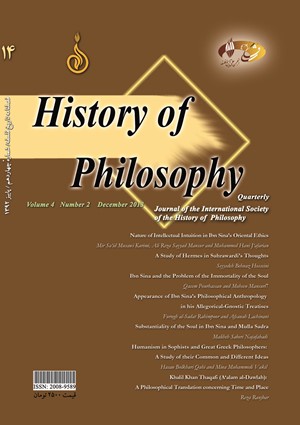Humanism in Sophists and Great Greek Philosophers:A Study of their Common and Different Ideas
Subject Areas : اندیشههای حکمی و فلسفی ایران باستانHasan Bolkhari Qahi 1 , Mina Muhammedi Vakil 2
1 - University of Tehran
2 - دانشگاه تهران
Keywords: Humanism Sophists Socrates Plato Aristotle human intellect ,
Abstract :
The Sophists were the first ancient thinkers who considered the issue of man as the main subject of philosophy. They were the first to change the direction of philosophical research from phusis to nomos. Almost at the same time and a short while after the rise of the Sophists, in spite of their disagreements with and fundamental oppositions to these thinkers, Socrates, Plato, and also Aristotle introduced man as the primary concern of philosophical theories. This was the main commonality between the views of the Sophists and ancient philosophers. On the other hand, there is also a kind of formal proximity between Socrates and the Sophists in terms of their method of dialectics and discourse. However, since Socrates considers a fixed criterion for knowledge which is free from sense impressions, he criticizes Protagoras’ statement as to “Man is the measure of all things”, and argues that Protagoras focuses on individual man and considers the truth to be relative. In this way, a comparative study of the ideas of the Sophists and philosophers reveals that both groups followed the same subject and method but had different purposes. The Sophists’ purpose was teaching, while philosophers sought their end in knowing the truth. This paper aims to discover the differences and similarities between these two approaches. In doing so, it initially deliberates accurately over their distinctive ideas and then clearly explains that some of the philosophical findings of the Sophists, in spite of their historical notoriety, have exercised some lasting effects on contemporary philosophy. In other words, by changing the direction of philosophy’s attention to the problem of man, in a sense, they developed the basis for modern philosophy.
ارسطو، مابعدالطبيعه، ترجمة محمدحسن لطفي، تهران، انتشارات طرح نو، چ2، 1385.
ارسطو، اخلاق نيکوماخوس، ترجمة محمدحسن لطفي، تهران، انتشارات طرح نو، چ3، 1389.
افلاطون، دورة کامل آثار افلاطون، ترجمة محمدحسن لطفي، تهران، انتشارات خوارزمي، چ3، 1380.
خراساني، شرفالدين، از سقراط تا ارسطو، تهران، انتشارات دانشگاه ملي ايران، چ2، 2536.
دکرشنتزو، لوچانو، فيلسوفان بزرگ يونان باستان، ترجمة عباس باقري، تهران، نشر ني، 1377.
دورانت، ويل، تاريخ تمدن، ج2، يونان باستان، ترجمه اميرحسين آريان¬پور، فتح¬الله مجتبائي و هوشنگ پيرنظر، تهران، انتشارات علمي و فرهنگي، چ 12، 1385.
زرين¬کوب، عبدالحسين، ارسطو و فن شعر، تهران، مؤسسة انتشارات اميرکبير، چ5، 1385.
سوفوکلس، افسانه¬هاي تباي، ترجمة شاهرخ مسکوب، تهران، انتشارات خوارزمي، 1352.
سيسرون، چهار خطابه از سيسرون، ترجمة مقدم مراغه¬اي، تهران، انتشارات جاويدان، 2536.
شوان، فريتيوف، عقل و عقلِ عقل، ترجمة بابك عليخاني، تهران، انتشارات هرمس با همکاري مرکز بينالمللي گفتگوي تمدنها، 1384.
کاپلستون، فردريک چارلز، تاريخ فلسفه، ج 1، يونان و روم، ترجمة سيد جلالالدين مجتبوي، تهران، شرکت انتشارات علمي و فرهنگي، چ8، 1388.
کاسيرر، ارنست، اسطوره¬ دولت، ترجمة يدالله موقن، تهران، نشر هرمس، 1377.
کاسيرر، ارنست، فلسفة صورتهاي سمبليک، ج2، انديشة اسطوره¬اي، ترجمة يدالله موقن، تهران، انتشارات هرمس، چ 3، 1390.
گاتري، دبليو. کي. سي، تاريخ فلسفه¬ي يونان، سوفسطاييان (بخش نخست)، ترجمة حسن فتحي، تهران، انتشارات فکر روز، 1375.
گاتري، دبليو. کي. سي.، سقراط، ترجمة حسن فتحي، تهران، انتشارات فکر روز، 1378.
گادامر، هانس گئورگ، آغاز فلسفه، ترجمة عزتالله فولادوند، تهران، انتشارات هرمس، چ2، 1384.
لاندمان، مايکل، انسان¬شناسي فلسفي، ترجمه و نگارش رامپور صدر نبوي، مشهد، چاپخانة طوس، 1350.
هالينگ ديل، ر.ج، مباني و تاريخ فلسفة غرب، ترجمة عبدالحسين آذرنگ، تهران، سازمان انتشارات کيهان، 1364.
Heidegger, Martin, Letter sur l’ Humanism, traduit et présenté par Roger Munier, Aubier, Paris, 1957.


